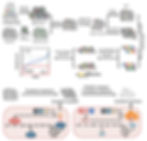CRISPR library screening identified PHGDH as a critical driver for Sorafenib resistance in HCC
- Jack Wong
- Oct 19, 2019
- 1 min read
Updated: Oct 20, 2019
Larry's CRISPR/Cas9 library screening study has been published in Nature Communications (Wei et al., Nat Commun 2019l 10:4681). This study is in collaboration with Dr. Carmen Wong's lab. Especially thanks to the great help from Derek Lee in the metabolic assays.
Sorafenib is the standard fist-line treatment for advance HCC. However, the development of drug resistance is a major clinical obstacle. Together with Dr. Carmen Wong's lab, we employed genome-wide CRISPR/Cas9 library screening technology to knockout 20,000 genes in human HCC cells and studied their effects on Sorafenib treatment sensitivity. We discovered phosphoglycerate dehydrogenase (PHGDH) as a critical driver for Sorafenib resistance. PHGDH is the first committed enzyme in the serine synthesis pathway (SSP). We showed that upon Sorafenib treatment, HCC cells activate PHGDH and SSP to produce αKG, serine, and NADPH, which enable HCC cells survive from oxidative stress induced by Sorafenib. Importantly, we showed that co-treatment of PHGDH inhibitors remarkably enhanced the anti-cancer efficacy of Sorafenib in HCC bearing mice. Furthermore, we showed that PHGDH is also important for the drug resistance of other FDA-approved tyrosine kinase inhibitors (TKIs), including Regorafenib and Lenvatinib. In summary, our results demonstrate that targeting PHGDH is an effective approach to overcome TKI drug resistance in HCC.

